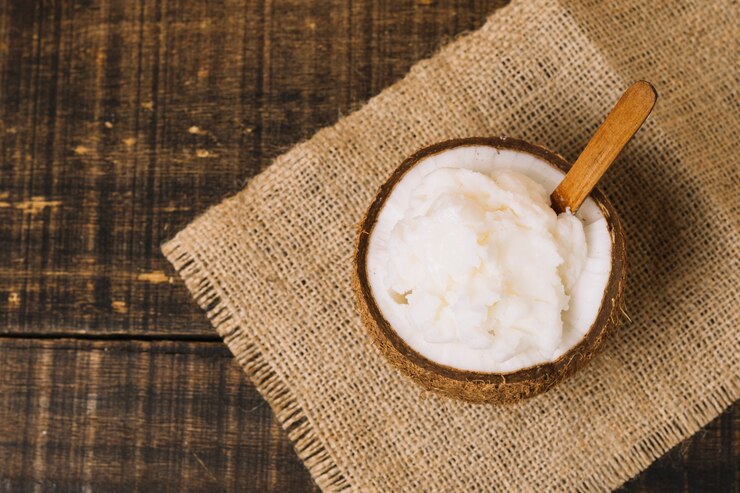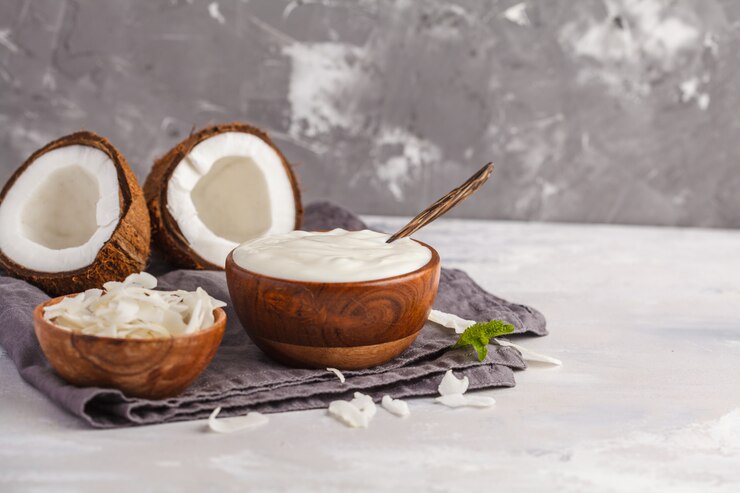Exploring Coconut Curd in Ayurveda

Key Takeaways Shortly
- Coconut curd is a popular dairy-free alternative in Ayurveda, made from coconut milk, offering a creamy texture and unique flavor.
- It is valued in Ayurveda for its cooling properties, ability to balance Pitta dosha, and as a gentle probiotic aiding digestion and gut health.
- As a plant-based probiotic, coconut curd provides a refreshing alternative to traditional dairy curds within Ayurvedic nutrition.
- Beyond taste, coconut curd supports hydration and heart health, embodying the diverse benefits of coconut in Ayurvedic medicine.
- Coconut curd's versatility allows for easy incorporation into meals, from smoothies to savory dishes, enhancing both health and flavor.
Coconut curd is a delightful twist on a traditional favorite. It brings together the creamy texture of coconut milk with the probiotic benefits often found in yogurt. Imagine the rich, tropical flavor of coconut combined with the health-boosting qualities of curd. This is what makes coconut curd a star in Ayurvedic practices. It's not just a treat; it's a healthful addition to your diet.
In Ayurveda, coconut is cherished for its cooling properties. It's believed to help balance the body's internal heat. Coconut curd, therefore, is more than a tasty snack—it's a way to harmonize your body's energies. The combination of coconut's natural benefits with the probiotic goodness of curd creates a food that's both delicious and good for you.
This article will explore the fascinating world of coconut curd, diving into its Ayurvedic roots and health benefits. You'll discover why this unique food is gaining popularity and how it fits into a balanced diet. So, if you're curious about incorporating more Ayurvedic foods into your life, keep reading to learn more about this delightful dish.
Ayurvedic Benefits of Coconut Curd
Coconut curd holds a special place in Ayurveda, an ancient Indian system of medicine known for its holistic approach. This creamy delight is loved not just for its taste but for its health benefits. In Ayurveda, coconut curd is believed to balance the body's doshas—Vata, Pitta, and Kapha—contributing to overall wellness.
One of the standout benefits is its potential to aid digestion. Coconut curd, like other probiotic foods in Ayurveda, introduces good bacteria into the gut. This can help improve digestion and boost immunity. According to a study published in the Journal of Ayurvedic and Integrative Medicine, a balanced gut microbiome is crucial for maintaining health and preventing diseases. This makes coconut curd a valuable addition to a healthy diet.
Coconut is known for its cooling properties, which is particularly beneficial in Ayurvedic practices. It helps to calm the Pitta dosha, which is associated with heat in the body. This means coconut curd can be especially soothing during hot weather or for those prone to heat-related issues.
Moreover, the benefits of coconut in Ayurvedic medicine extend beyond digestion and cooling. It's rich in nutrients like vitamins C, E, B1, B3, B5, and B6, along with iron, selenium, sodium, calcium, magnesium, and phosphorous. These nutrients support various bodily functions, from boosting the immune system to enhancing skin health.
Coconut curd is also easy to incorporate into daily meals. You can enjoy it as a refreshing side dish or mix it with fruits for a nutritious dessert. This versatility makes it a practical choice for those looking to embrace Ayurvedic eating habits. With its rich taste and health benefits, coconut curd is more than just a food item—it's a step toward holistic health.
Don't wait or self medicate. Start chat with Doctor NOW
Probiotic Foods in Ayurveda
Ayurveda, an ancient system of medicine from India, values balance and harmony in the body. Probiotic foods play a crucial role in this balance. They help maintain a healthy gut, which is vital for overall well-being. In Ayurveda, the gut is often referred to as the body's second brain.
Probiotics are live bacteria that are good for your health, especially your digestive system. They are found in foods like yogurt, kefir, and fermented vegetables. In Ayurveda, these foods are believed to aid digestion and boost immunity. They are thought to balance the body's doshas, which are the energies believed to circulate in the body.
-
Fermented Foods: These are rich in probiotics. Things like pickles and sauerkraut are common examples. They help in maintaining a healthy digestive tract.
-
Herbal Teas: Some herbal teas, like ginger or peppermint, can support digestion and have probiotic-like effects.
-
Dairy Alternatives: Coconut curd is an excellent option. It's dairy-free and aligns well with Ayurvedic principles, providing probiotic benefits without lactose.
Including probiotic foods in your diet can have several benefits. They can improve digestion, enhance nutrient absorption, and strengthen your immune system. In the Ayurvedic context, they help in balancing the body's energies, leading to better health and vitality.

Incorporating Coconut Benefits
Coconuts offer a treasure trove of benefits, especially when seen through the Ayurvedic lens. This ancient practice values natural ingredients and coconuts stand out for their soothing properties.
-
Digestive Aid: Coconut curd is gentle on the stomach. It helps improve digestion, thanks to its probiotic nature. Probiotic foods in Ayurveda are known to balance gut flora, promoting a healthier digestive system.
-
Cooling Effect: Coconuts are considered cooling in Ayurveda. They can help reduce body heat, making them a great choice during hot weather. This cooling effect can also help calm the mind, reducing stress and anxiety.
-
Nutrient-Rich: Packed with vitamins and minerals, coconut products contribute to overall wellness. They provide essential nutrients like potassium and magnesium, which support various body functions.
-
Hydration: Coconuts are excellent for hydration. The water inside a coconut is rich in electrolytes, making it a natural sports drink alternative.
-
Skin and Hair Care: The benefits extend to beauty routines too. Coconut oil and milk are popular for moisturizing skin and hair. They help keep them soft, smooth, and shiny.
Incorporating these coconut benefits into your life can align your lifestyle with Ayurvedic practices, enhancing your overall well-being.

Practical Uses of Coconut Curd
Coconut curd is more than just a tasty treat. It's packed with benefits that align with Ayurvedic principles, making it a valuable addition to your diet. This creamy delight can be a tasty alternative for those looking to explore the world of probiotic foods through an Ayurvedic lens. Whether you're mixing it into smoothies or using it as a base for sauces, the possibilities are endless.
For those who love a hint of coconut in their meals, coconut curd can be a game-changer. Use it as a spread on toast or mix it with herbs for a delicious dip. Its versatility means you can incorporate it into sweet and savory dishes alike, enhancing both flavor and nutritional value. Plus, it's a fantastic way to reap the coconut benefits that Ayurvedic traditions celebrate.
As you experiment with coconut curd, don't hesitate to get creative. Try it in different recipes and share your experiences. Your culinary adventures may inspire others to embrace this healthy, flavorful ingredient. If you're passionate about food and wellness, why not spread the word? Share your thoughts in the comments or pass this article along to friends who might be interested. Let's make coconut curd a staple in kitchens everywhere!
FAQ For Coconut Curd
What is coconut curd, and how is it made?
Coconut curd is a dairy-free alternative made from coconut milk. It's created by fermenting the milk with probiotics, resulting in a creamy texture and unique flavor. This makes it an excellent choice for those seeking plant-based options and the probiotic benefits associated with curds.
What are the Ayurvedic benefits of coconut curd?
In Ayurveda, coconut curd is valued for its cooling properties and its ability to balance the Pitta dosha. It is considered a gentle probiotic that aids digestion and promotes gut health, making it a soothing addition to an Ayurvedic diet.
How does coconut curd fit into the category of probiotic foods in Ayurveda?
Probiotic foods are essential in Ayurveda for maintaining gut health, and coconut curd is a notable plant-based probiotic. It provides a refreshing alternative to traditional dairy curds, aligning well with Ayurvedic principles of nutrition and balance.
What are the health advantages of incorporating coconut into the diet?
Coconut, including coconut curd, is known for its hydrating properties and support for heart health. In Ayurveda, coconut is revered for its nutritional benefits, which include promoting hydration and overall well-being, translating these advantages into the consumption of coconut curd.
How can I incorporate coconut curd into my meals?
Coconut curd is versatile and can be included in various recipes. You can use it in smoothies, mix it into savory dishes, or enjoy it as a standalone snack. Its creamy texture and flavor make it a delightful addition to both sweet and savory culinary creations.
Can coconut curd be used as a substitute for dairy curds in recipes?
Yes, coconut curd can be a great substitute for dairy curds, especially for those who are lactose intolerant or prefer plant-based options. It provides a similar texture and adds a unique flavor to dishes, making it an excellent alternative in recipes that call for traditional curd.
Is coconut curd suitable for all doshas in Ayurveda?
Coconut curd is particularly beneficial for balancing the Pitta dosha due to its cooling properties. However, individuals with different doshas can also enjoy it, especially if they desire the probiotic benefits, but they may need to consider their overall dietary balance in consultation with an Ayurvedic practitioner.
Got any more questions?
Ask Ayurvedic doctor a question and get a consultation online on the problem of your concern in a free or paid mode.
More than 2,000 experienced doctors work and wait for your questions on our site and help users to solve their health problems every day.

